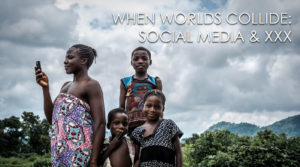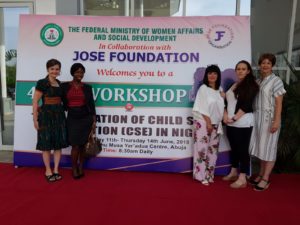The issue of sexual exploitation knows no borders. Consider the case of Nigeria where sex trafficking and exploitation are pervasive throughout the country. Vulnerable populations, most notably young girls, face high risk of sex trafficking as harsh economic struggles in a country where options remain meager push children (and adults) to seek employment opportunities far outside their native villages. All too often, they are lured into a world of sexual violence and abuse with promises of jobs and economic security.
The website Punch recently reported a sadly stereotypical case. In this instance, three Nigerian girls, Oke, Efe, and Gift, were promised jobs as “salesgirls.” They needed money in order to pay their school fees, and so accepted the offer of work. However, as Oke told a reporter, “‘When we got to Lagos, Aunty Anita said we would be ‘seeing’ men. She said we would be doing prostitution. We protested that she did not tell us that before we left the village. She said if she told us, we would not follow her. We told her we could not do it. She said if we refused, there was no way we could get transport fare to return home.’”
Poor economic conditions in Nigeria are exacerbated by political unrest and social upheaval, causing many to seek asylum, whereupon Nigerian children are commonly targeted and sexually exploited. A 2018 report by Save the Children estimates that as many as 4,570 minors migrating to Italy are untraceable. Many of those children will likely end up sexually trafficked into Italy’s prostitution markets. The reported noted that Nigerian and Romanian girls are among the most targeted by sex trafficking networks.
Further, widespread abductions the group Boko Haram have also plagued the country. UNICEF reports that since 2013, more than 1000 children have been abducted by Boko Haram in northeastern Nigeria.
The issue of child sexual abuse is also a significant problem plaguing Nigeria. For instance, a 2017 Nigerian study which surveyed 350 female secondary school students found that nearly 43% of the 146 students aged 13-15 were sexually abused; among the 204 girls aged 16–17 the rate of sexual abuse was 48%. This is nearly double the rate of child sexual abuse in the U.S. according to a 2014 study. That study surveyed a total of 2,293 15-17-year-olds, and reported 26.6% of 17-year-old girls have experienced sexual abuse. Rates for sexual abuse among 15-year-old girls were 16.8%.
As the authors of the Nigerian study noted, “Child sexual abuse is associated with factors that enhance the vulnerability of the child. . . .” They are quite right. In addition to a wide range of psychological sequelae such as depression, disassociation, self-injury, substance abuse, sexual difficulties, and more, numerous studies have shown that child sexual abuse is a significant factor in sexual revictimization of both adolescents and adults. Revictimization may include sexual coercion, sexual assault (attempted or completed), increased sexual violence from partners and non-partners, and future involvement in commercial sexual exploitation (prostitution).
In light of these concerns, we were very pleased when earlier this year NCOSE received an invitation to participate in a workshop entitled “The Elimination of Child Sexual Exploitation (CSE) in Nigeria.” The event was organized by Nigeria’s Ministry of Women Affairs and Social Development in collaboration with the Jose Foundation (a UK-based charity), and took place in Abuja, Nigeria, from June 11-14. Experts from Nigeria and around the world came together to create solutions to prevent child sexual exploitation.
NCOSE sent our Vice President of Policy and Research Lisa Thompson, who gave two presentations: “When Worlds Collide: Social Media & XXX” and “Shattered Innocence: The Role of ‘Adult’ Pornography in the Sexual Abuse of Children.” Several people later told Lisa that her presentations were the first time they heard someone address the roles of pornography and social media in fueling child sexual abuse and exploitation. After one of Lisa’s presentations one man boldly shared with attendees his story of how his early exposure to pornography had led to years of compulsive sexual behaviors.

Also as a result of the conference Lisa learned that there are many organizations and individuals dedicated to ending child exploitation in Nigeria. By forming new relationships and alliances with these groups, NCOSE is excited to help further build upon the international movement to end sexual exploitation.
One such organization NCOSE connected with is the Child and Youth Protection Foundation (CYPF). CYPF is focused on protecting children and youth from all forms of abuse, and provides services such as counseling, legal advice, referrals, a girl child education program, and more. Discussing the challenges in combating CSE in Nigeria, CYPF representative Kolawole Olatosimi talked about the importance of educating the public to understand that children cannot “consent” to sexual exploitation. He urged all to become involved in fighting sexual exploitation by saying, “Protecting children from [child sexual exploitation] is everybody’s business and it must start with YOU.”

Additionally, participants at the conference created and later submitted a Communique, which outlined 14 areas of action, to Nigeria’s Ministry of Women’s Affairs and Social Development for adoption and implementation. NCOSE was able to have a significant influence on the recommendations put forward in the document—including an important recommendation for Nigeria to require Internet service providers (ISPs) to implement an “opt-in” system for accessing pornography and ensuring that all schools, libraries, and public spaces have Internet filters in place to protect children from exposure to sexually graphic material online.
NCOSE is excited to have connected with so many outstanding leaders and advocates while in Nigeria, and we look forward to supporting their ongoing efforts. NCOSE believes that while sexual exploitation knows no borders, neither should our efforts to eradicate it.

